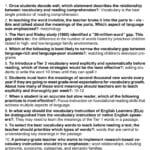Navigating the ethical landscape of occupational therapy requires a solid understanding of the guiding principles that shape professional conduct. This comprehensive guide delves into the 2024 AOTA Code of Ethics, providing practical insights and real-world applications for today’s OT practitioners.
Understanding the AOTA Code of Ethics
The AOTA Code of Ethics serves as a moral compass for occupational therapists, guiding ethical decision-making and prioritizing client well-being. It outlines the core values and principles that underpin the profession, offering a framework for navigating the complexities of ethical practice. This isn’t just a static document; it evolves alongside the profession, reflecting the changing healthcare landscape and emerging ethical considerations.
Core Values and Principles
The Code is grounded in seven core values: altruism, equality, freedom, justice, dignity, truth, and prudence. These values shape the principles that guide ethical conduct, including beneficence, nonmaleficence, autonomy, justice, veracity, and fidelity, providing a framework for navigating challenging situations. These principles are not just abstract concepts; they have practical implications for how OTs interact with clients, colleagues, and the wider community. For example, respecting a client’s autonomy might mean supporting their decision to decline a recommended intervention, even if you disagree with their choice.
Standards of Conduct: Translating Principles into Action
The Standards of Conduct provide specific guidelines for applying ethical principles in everyday practice. They cover critical areas such as confidentiality, informed consent, conflicts of interest, and cultural competence. These standards offer actionable steps for maintaining ethical integrity in various situations. For instance, adhering to confidentiality standards means protecting client information and respecting their privacy. This builds trust and ensures that clients feel safe sharing sensitive information.
Support and Accountability
The AOTA Ethics Commission plays a crucial role in upholding the Code. They investigate complaints and take appropriate action when necessary. The AOTA also offers a wealth of resources, including educational materials, ethics consultations, and an online ethics webpage to support OTs in navigating ethical dilemmas. These resources provide valuable guidance and support for maintaining ethical practice.
Real-World Applications: Putting the Code to Work
The Code comes to life through real-world examples. Consider a scenario where a client refuses a treatment you believe is essential. The principle of autonomy dictates that you respect their decision, even if you disagree. Or imagine a situation where you’re tempted to disclose a client’s personal information. The standards of confidentiality clearly guide you in protecting that information. These scenarios illustrate how the Code provides a framework for navigating complex ethical challenges.
| Ethical Principle | Real-World Example |
|---|---|
| Autonomy | Respecting a client’s decision to decline a recommended intervention. |
| Beneficence | Providing evidence-based treatments to maximize a client’s functional independence. |
| Nonmaleficence | Avoiding treatments with known risks that outweigh potential benefits. |
| Justice | Advocating for equal access to occupational therapy services for all clients. |
| Veracity | Providing accurate and honest information to clients about their prognosis and treatment options. |
| Fidelity | Maintaining client confidentiality and respecting professional boundaries. |
Connecting Ethics to Practice and Standards
The Code of Ethics doesn’t exist in isolation. It works in tandem with the AOTA Standards of Practice for Occupational Therapy, creating a comprehensive framework for ethical and effective practice. These two documents complement each other, ensuring that client care is always at the forefront of occupational therapy.
Maintaining Ongoing Ethical Awareness
The healthcare landscape is constantly evolving, presenting new ethical considerations. Ongoing self-reflection and continuing education are essential for staying up-to-date with current ethical guidelines. By embracing lifelong learning and engaging in critical self-analysis, OTs can continually refine their ethical decision-making and contribute to the advancement of the profession.
Decoding the 7 Core Values: A Deep Dive into the AOTA Code of Ethics
The AOTA Code of Ethics is built upon seven core values: altruism, equality, freedom, justice, dignity, truth, and prudence. These values form the bedrock of ethical practice for occupational therapists. Let’s delve deeper into each value:
Altruism: This involves demonstrating genuine concern for the well-being of others and prioritizing client needs above personal gain.
Equality: Treating all individuals impartially and without bias, recognizing the inherent worth of every person regardless of their background or circumstances.
Freedom: Respecting client autonomy and their right to make choices about their own lives and treatment, even if those choices differ from professional recommendations.
Justice: Promoting fairness and equity in access to occupational therapy services, advocating for just distribution of resources and opportunities for all.
Dignity: Treating all individuals with respect and honoring their inherent worth, creating a safe and supportive environment where clients feel valued and heard.
Truth: Providing accurate and transparent information in all professional interactions, building trust through honesty and integrity.
Prudence: Using sound judgment and clinical reasoning when making decisions, carefully considering potential risks and benefits and acting in the best interests of the client.
These core values provide the ethical compass for occupational therapists, guiding their actions and shaping their interactions with clients and colleagues. They highlight the importance of client-centered care, professional integrity, and a commitment to social justice.
Navigating Ethical Dilemmas: Your Guide to the AOTA Code of Ethics 2020 (and beyond)
The 2020 AOTA Code of Ethics, and subsequent revisions, addresses emerging ethical challenges related to evolving healthcare practices and technological advancements. These updates reflect the profession’s commitment to staying current with the complex ethical dilemmas that arise in contemporary practice, research, education, and policy. Some experts suggest that areas like telehealth, artificial intelligence, and assistive technologies will continue to present new ethical challenges for occupational therapists. There is ongoing debate about how to best balance client autonomy with the need to protect vulnerable individuals in these evolving landscapes. The AOTA Ethics Commission plays a vital role in interpreting and applying the Code, providing resources and guidance to members navigating these complex issues. They also handle ethics complaints against AOTA members, upholding professional integrity and promoting public trust. Understanding and applying the AOTA Code of Ethics is essential for all occupational therapy personnel. It ensures ethical practice, protects clients, and advances the profession’s mission.
Discover an abundance of study materials by accessing our comprehensive guide to ati teas math questions. Additionally, gain a deeper understanding of chemical bonding by exploring the alcl3 lewis structure in our extensive article.
- Sept 31 Myth: Unveiling Calendar Secrets - March 18, 2025
- How Long & Till December 18, 2025: Accurate Countdown Guide - March 18, 2025
- Discover Japanese Artists: A Complete History - March 18, 2025

















1 thought on “The 2024 AOTA Code of Ethics: A Practical Guide for Today’s OT”
Comments are closed.